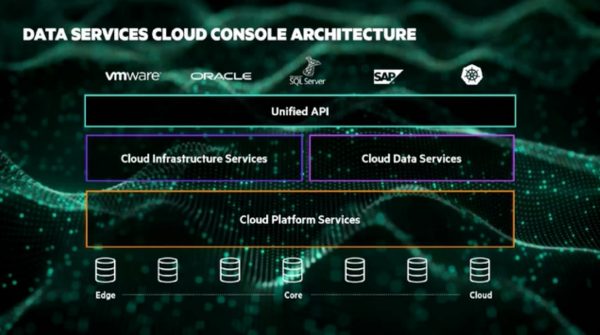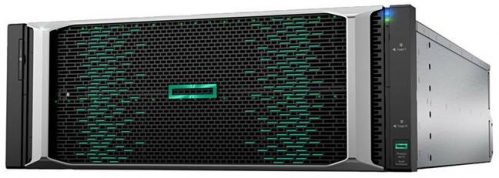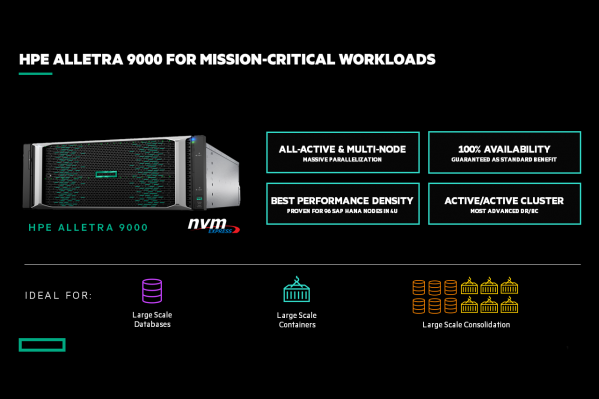HPE Expands GreenLake
With storage as-a-service business transformation
This is a Press Release edited by StorageNewsletter.com on May 6, 2021 at 2:34 pmHewlett Packard Enterprise announced innovations that transform HPE Storage into a cloud-native, software-defined data services business.
As part of thiss news, it unveiled a data services platform that delivers on its Unified DataOps vision for a new data experience that brings a cloud operations model to wherever data lives and unifies data operations. The new platform is designed to address the data explosion edge-to-cloud, collapse the silos and complexity that plague data environments, maximize agility and innovation, and reduce business risk. This announcement marks a milestone in company’s vision to become an edge-to-cloud platform as-a-service company. The new data services platform, available through HPE GreenLake, consists of 3 new innovations that simplify data operations from edge to cloud, including:
- Data Services Cloud Console, a cloud console that delivers cloud operational agility and unified data operations as a service
- Cloud data services, a suite of software subscription services that simplify and automate global infrastructure management at scale
- HPE Alletra, a new portfolio of cloud-native data infrastructure that powers data edge-to-cloud
“Organizations face a complex web of fragmented hardware, software, and manual processes, making it difficult for them to compete and innovate in a constantly changing marketplace,” said Antonio Neri, president and CEO. “HPE was the first to recognize the need to deliver a unified and consistent cloud experience, from edge to cloud, with HPE GreenLake. Today’s announcement builds on this strategy, by enabling our customers to break down silos and leverage data, wherever it resides, with unified data operations. As we enter the age of insight, HPE is providing the ideal platform for organizations seeking to apply distributed data to fuel AI initiatives, deliver new customer experiences, and drive digital transformation.”
Unified DataOps: Vision to accelerate data-driven innovation
Organizations are struggling with complexity. As reported by data management research survey of IT decision makers conducted by ESG for HPE, 93% of IT decision makers see storage and data management complexity impeding digital transformation and 67% of surveyed organizations see fragmented data visibility across hybrid cloud creating business risk.
Unified DataOps is HPE’s vision for a new data experience that integrates data-centric policies, cloud-native control, and AI-driven insights to eliminate the silos and complexity of data management and infrastructure, drive operational agility across edge-to-cloud, minimize business risk, and accelerate data-driven innovation.
“HPE is changing the storage game by bringing a full cloud operational model to our customers’ on-premises environments,” said Tom Black, SVP and GM, HPE Storage. “Bringing the cloud operational model to where data lives accelerates digital transformation, streamlines data management, and will help our customers innovate faster than ever before.”
“It’s getting harder to manage the ever-increasing data flooding organizations,” said Matt Eastwood, SVP, enterprise infrastructure, cloud, developers, and alliances, IDC. “HPE’s vision and strategy for Unified DataOps is promising as it takes an original approach to solving this burgeoning problem. As an industry leader, HPE is providing the market with answers for how to capitalize on information, wherever it resides, to transform their business with data.”
Delivering cloud experience and streamlining data management
This introduction of a new data services platform delivers on the Unified DataOps vision with the Data Services Cloud Console, cloud data services, and HPE Alletra – that together bring cloud operational agility and streamline data management for customers.
“We are excited that HPE is continuing to innovate in ways that allow us to streamline operations, while increasing our agility and ability to continually deliver outstanding services at scale to our global base of partners and customers,” said Justin Giardina, CTO, iland Internet Solutions Corporation. “The operational simplicity provided by the Data Services Cloud Console and HPE Alletra will contribute to our ability to do so.”
Data Services Cloud Console
Data Services Cloud Console is a cloud console that delivers cloud operations and unified data operations as a service. Designed to deliver a collection of cloud data services, it is based on proven, secure, cloud-native technology that underpins Aruba Central – the engine that serves millions of devices connected across tens of thousands of customers in clusters deployed around the world. The cloud console offers a unified API for HPE-led automation for applications, partner-led and custom-built data services, and gives developers access to infrastructure and data as code.
Cloud Data Services
Delivered through the Data Services Cloud Console, HPE is introducing Data Ops Manager for global management of data infrastructure from anywhere, from any device, and intent-based provisioning that brings a paradigm shift to data infrastructure provisioning with an AI-driven, application-centric approach that enables self-service, on-demand provisioning, eliminates guesswork, and optimizes service level objectives (SLOs).
HPE Alletra
It is cloud-native data infrastructure that powers data from edge-to-cloud. Managed natively by the Data Services Cloud Console, it delivers the cloud operational experience. It features a portfolio of workload-optimized systems consisting of All-NVMe HPE Alletra 9000 and 6000 systems to deliver architectural flexibility to run any application without compromise.
Data Services Cloud Console, cloud data services, and HPE Alletra will be available for order globally direct and through channel partners May 2021.
Comments
This is a significant launch for HPE covering a domain they wish to play a key role in, capitalizing on the GreenLake success and recognition.
Unified DataOps, wow it seems that every word is important here. It is supported by 3 products and/or solutions named Data Services Cloud Console, Cloud data services and Alletra. Thus it is focused on infrastructure management but here a few remarks we'll develop later.

HPE recognized that the cloud model is a must, it's never too late, we're almost mid 2021. Users expect to be agile and elastic and wish to consume every IT resource as-a-service with a pure software model, charged per unit of time, incrementally like the cloud. In fact, the model should be independent of the infrastructure spanning potentially private and public data centers and clouds, resources could potentially reside anywhere.
We notice once again that the firm consolidates on acquisition as Aruba and Nimble InfoSight served as roots for these new service offerings. With credible AI embedded services, the engineering team has realized some clever developments that will simplify the modern data center operations targeting long and complex tasks. The idea of programmable data center or infrastructure makes some progress. There are some interesting features such intent-based provisioning that combines the global knowledge of the storage environment, applications workloads, templating, learning phase and historical informations. At scale users also require high automation levels to deliver more reliable services faster.
Data is used everywhere because infrastructure data is the fuel of these solutions but promoting a new data vision, we have expected different products or not only these ones. As said, it is a major launch for the company to regain some credibility in the data center and cloud-based domain. HPE continues to release block storage and again nothing on file and object storage. We can even ask ourselves if HPE really believes in file and/or object? For such solutions they choose to rely on third party software such CTera Networks, Cohesity, Qumulo, Scality, WekaIO, IBM Spectrum Scale and Nutanix, if we include them in the storage domain, all good proven products, no doubt about them. We really hope HPE will change and decide to be serious - to own something - in these areas with some acquisitions. Some of these names will fit pretty well in the HPE portfolio and address immediately holes. But again it has to be done carefully as PolyServe and Ibrix acquisitions have been disasters.
The company declared that cloud-native applications are paramount for enterprises, they support of course - it's a minimum CSI, but it continues to not have their own object storage solution for such needs as they chose to support Scality again in such environments. This is a bit paradoxal, and, at the same time, consistent with its choice for classic object storage needs. But as an investor for several years in the company via its Pathfinder investor force, we all wonder why HPE didn't make the move and offer a price to acquire the software vendor. Probably some divergence about the number of dollat digits... But notice that HPE didn't make the move for Portworx or Hedvig, even with some investments in them.

HPE Alletra storage array line is a surprise as the storage group already released some time ago the Primera line. The description of the 2 models - 6000 and 9000 - are a bit fuzzy apart being a full NVMe array in 4U chassis with 24 and 48 drives respectively. In such dimension, the 9000 series offers 656TB raw for 2,000TB effective after compaction, compression, de-dupe and thin provisioning coupled with RAID-6 (10+2 NVMe drives associations) data protection service. Host interface could be FC or Ethernet and 2 cache sizes are available: 1,024Gb for the 9060 or 3,072GB for the 9080 model.

We understand they represent the new generation of Primera and Nimble arrays respectively. With the 9000 model, the firm claims to deliver 100% availability, which is ambitious, and at the same time dangerous. It is based on an all active multi-node model leveraging a real massively parallel architecture. This high-end model delivers 2 million IO/s per chassis. The 6000 model is positioned to deliver 6 nines of availability.
But HPE had to react and innovate against the competition. At the storage strategy level, we wish to insist that outside block, we don't see the company playing a serious role as they don't own key software. We really expect to see some other developments as HPE promotes unified data management and it should go beyond block. Block storage is good but for a company like HPE, this is clearly not enough.














 Subscribe to our free daily newsletter
Subscribe to our free daily newsletter

